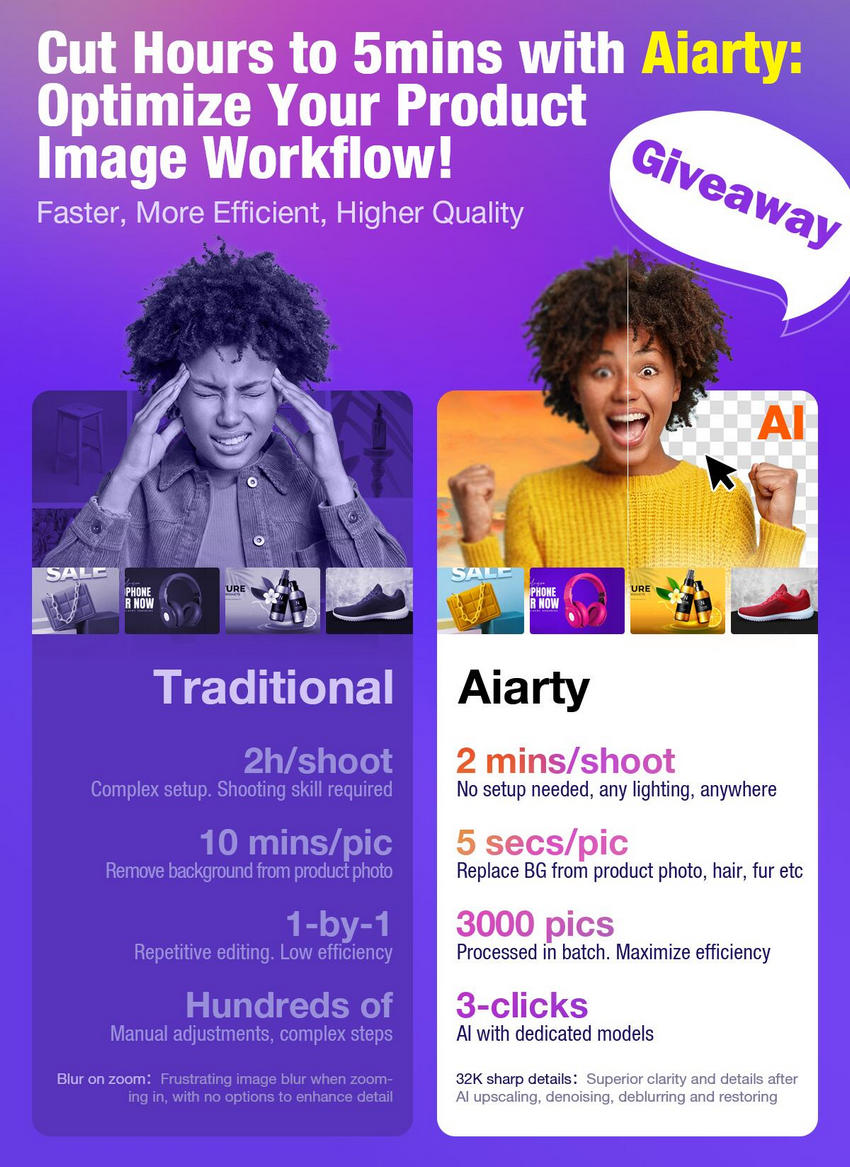10 Best Ecommerce Platforms for Small Businesses (Free & Affordable Options)
Updated on
With limited resources and the constant pressure to streamline operations, entrepreneurs often face challenges in choosing a platform that meets their unique needs—whether it's ease of use, cost-efficiency, scalability, or integrated marketing tools. According to recent research from Statista, 80% of small businesses now rely on online sales channels, underscoring the critical need for a robust eCommerce solution. This article will explore the 10 best eCommerce platforms for small businesses that can grow alongside your business.
Best Ecommerce Software For Small Business – Aiarty Image Matting
For small e-commerce businesses, high-quality product images are essential for attracting customers and increasing conversions, but professional image editing is often time-consuming and labor-intensive. Aiarty Image Matting is designed to solve this pain point.
This AI tool is designed for e-commerce sellers, providing one-click precise image matting, background replacement, and image enhancement.
Aiarty Image Matting empowers small e-commerce businesses to create professional product photos quickly and easily. This AI-powered tool offers one-click image matting, background removal, and enhancement, handling complex edges and batch processing thousands of images in seconds. Its intelligent recognition preserves subject details, while enhancement features boost resolution and clarity, meeting platform standards like Shopify and WooCommerce. Without Photoshop skills or outsourcing, businesses can create a unified brand aesthetic.
Get free Aiarty Image Matting license for small businesses!


Isolate Subjects & Change Backgrounds with Aiarty Image Matting
Step 1. Download and install Aiarty Image Matting on your PC or Mac. Drag and drop your product images (up to 3000+) into the software.
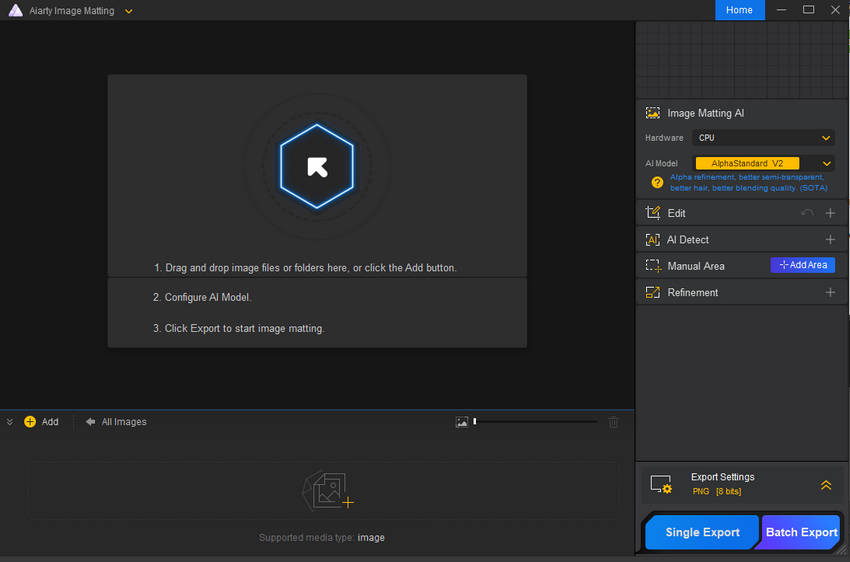
Step 2. Choose the best AI model for your image:
- AlphaStandard V2: Semi-transparent objects (dresses, glass, hair, pets).
- AlphaEdge V2: Sharp edges/silhouettes (portraits, anime, tattoos).
- EdgeClear V2: Detailed objects (birds, bicycles, cars, furniture).
- SolidMat V2: Solid objects (bags, shoes, buildings).

Step 3. (Optional) Use "+Add area" to select the main subject. Click "Start" in the Image Matting panel. Refine results with Eraser, Brush, Dodge, and Burn tools, if needed.
Step 4. In the "Effects" panel, select "Background." Choose a solid color, gradient, or import a custom image.

Step 5. In "Export Settings," choose your output format and quality. Export images individually or in bulk ("Single Export" or "Batch Export").
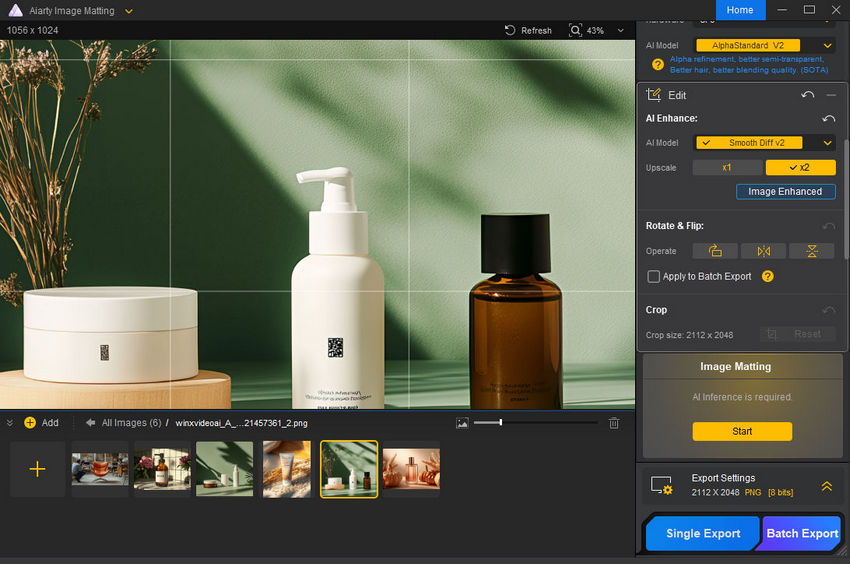
Top 10 Ecommerce Platforms Recommendations for Small Businesses
Shopify - Best All-in-One E-Commerce Solution
- Price: $29/month for Shopify Basic
- Free trial length: 3 days
- Integrated sales channels: Online store, in-person, social media, email, B2B.
- Best for: WordPress users seeking full customization and low upfront costs.
Shopify stands out as one of the best ecommerce platforms for small business seeking scalability and ease of use. Starting at $39/month, it offers a comprehensive solution for small to mid-sized businesses with an annual revenue of less than $500K. Its user-friendly, no-code interface makes it accessible to entrepreneurs without technical skills, while its robust features, such as payment gateways like PayPal and Stripe, cater to both local and international markets. Shopify is particularly suited for selling physical goods, digital products, and subscription services. The platform provides 24/7 customer support through live chat, which is critical for small teams.
Hidden costs such as transaction fees and third-party integrations can add up. Migrating from anotherbest free ecommerce platform for small business can be challenging depending on the size of your product catalog and customer data, but Shopify’s scalability makes it a strong contender for growing businesses.

- Scalable for growing businesses
- No coding needed
- Multiple sales channels integrated
- 24/7 customer support
- Mobile app & native POS
- Supports various payment gateways
- Wide app marketplace
- Transaction fees (unless using Shopify Payments)
- Costs for third-party apps
- Migration can be complex
- Advanced features require higher-tier plans
- Customization may need coding
WooCommerce - Best for WordPress Users Seeking Full Customization
- Price: Free (hosting, themes, and extensions cost extra)
- Free trial length: No trial; open-source platform
- Integrated sales channels: Online store, social media, marketplaces, and more
- Best for: WordPress users seeking full customization and low upfront costs.
WooCommerce is a powerful best ecommerce platform for small business plugin for WordPress, ideal for small businesses with annual revenues under $500K. Its open-source nature allows for extensive customization, but it requires a bit more technical know-how, particularly for setup and ongoing management. For entrepreneurs comfortable with WordPress, WooCommerce offers an affordable solution with a strong focus on local and international markets, supporting payment gateways like PayPal and Stripe. It's suitable for selling physical goods, digital products, and subscription-based services.
WooCommerce's reliance on third-party plugins, hosting, and themes can lead to hidden costs, and its customer support is community-based rather than 24/7. Its full control over customization makes it an attractive choice for growing businesses looking for flexibility.

- Completely customizable (via WordPress)
- No upfront fees (except for hosting & plugins)
- Supports a variety of payment gateways (PayPal, Stripe, etc.)
- Ideal for WordPress users
- Suitable for physical, digital, and subscription products
- Large community support and resources
- Requires technical knowledge for setup and maintenance
- Hidden costs for hosting, themes, and extensions
- Customer support is community-based, not 24/7
- Complex migration from other platforms
- Can be resource-intensive (server costs, performance issues)
Square Online - Best for Small Businesses Seeking Simple E-Commerce Setup
- Price: Free (Paid plans start at $12/month)
- Free trial length: No trial; free plan available
- Integrated sales channels: Online store, in-person sales (via Square POS), social media, email
- Best for: Small businesses needing a straightforward e-commerce solution with integrated payment processing.
Square Online is a user-friendly best ecommerce platform for small business ideal for small businesses or startups with annual revenues under $500K. It offers a free plan that allows you to get started quickly, with easy integration of Square’s POS system for in-person sales. Square’s strong payment processing capabilities (through Square Payments) streamline the checkout experience, and the platform supports multiple sales channels, including social media and email. It’s a great option for businesses that need a simple, budget-friendly solution.
The best ecommerce platform for small business does come with limitations, such as transaction fees and limited customization options. Paid plans unlock more features, but businesses should be mindful of hidden costs for third-party tools and integrations. Migrating to Square Online from another platform is relatively simple but may not offer the flexibility that highly customized businesses need.

- Free plan available to get started
- Easy integration with Square POS for in-person sales
- Simple, user-friendly interface
- Good for small businesses with basic e-commerce needs
- Affordable paid plans
- Integrated payment processing with Square Payments
- Free plan has limitations (transaction fees, lack of customization)
- Not as customizable as other platforms (e.g., WooCommerce)
- Limited features on the free plan
- Additional costs for third-party integrations
- Best suited for simple business models
BigCommerce - Best for Growing Businesses Needing Scalability
- Price: Starts at $39/month
- Free trial length: 15 days
- Integrated sales channels: Online store, social media, marketplaces, B2B, and more
- Best for: Mid-sized businesses looking for robust scalability and multi-channel sales.
BigCommerce is the best ecommerce platform for small business with annual revenues under $500K. It offers a robust e-commerce solution with a focus on scalability, allowing businesses to expand without worrying about outgrowing the platform. BigCommerce supports a variety of sales channels, including online stores, social media, marketplaces, and B2B. With built-in payment gateways like PayPal, Stripe, and others, it caters to both local and international markets.
While BigCommerce provides a comprehensive suite of features, its pricing starts higher than platforms like Shopify or Square Online, which might be a consideration for smaller businesses. Its customer support is generally good, with 24/7 live chat available, but there are hidden costs such as transaction fees and third-party integrations that can add up. Businesses should be prepared for the setup process.
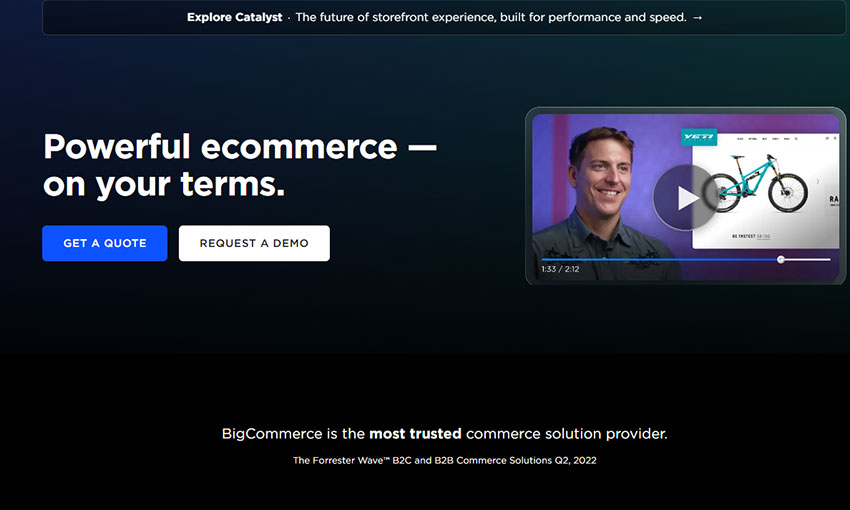
- Highly scalable for growing businesses
- Supports a wide range of sales channels (social media, marketplaces, B2B)
- 24/7 customer support with live chat
- Built-in payment gateways (PayPal, Stripe, etc.)
- Robust product catalog and inventory management
- Good for both physical and digital products
- Higher pricing compared to entry-level platforms
- Additional fees for certain payment gateways
- Customization requires a higher level of technical knowledge
- Additional costs for third-party apps and integrations
- Migration can be time-consuming depending on platform
Wix eCommerce - Best for Small Businesses and Beginners Looking for Easy Setup
- Price: Starts at $23/month
- Free trial length: 14 days
- Integrated sales channels: Online store, social media, marketplaces, email marketing
- Best for: Small businesses or entrepreneurs needing a simple and visually appealing website with e-commerce functionality.
Wix eCommerce is an intuitive best ecommerce website for small business, offering an easy-to-use interface with drag-and-drop functionality. Ideal for businesses with annual revenues under $500K, Wix allows users to set up a stylish and functional online store without technical expertise. It supports multiple sales channels, including social media, email marketing, and marketplaces, and provides a variety of templates for quick design customization.
While Wix is perfect for beginners, it does have limitations in terms of scalability and customization compared to other e-commerce platforms. The pricing starts at $23/month, and while this covers most basic features, additional costs for apps, payment gateways, and advanced integrations can add up. Migrating from another platform can also be challenging due to Wix’s more closed ecosystem.
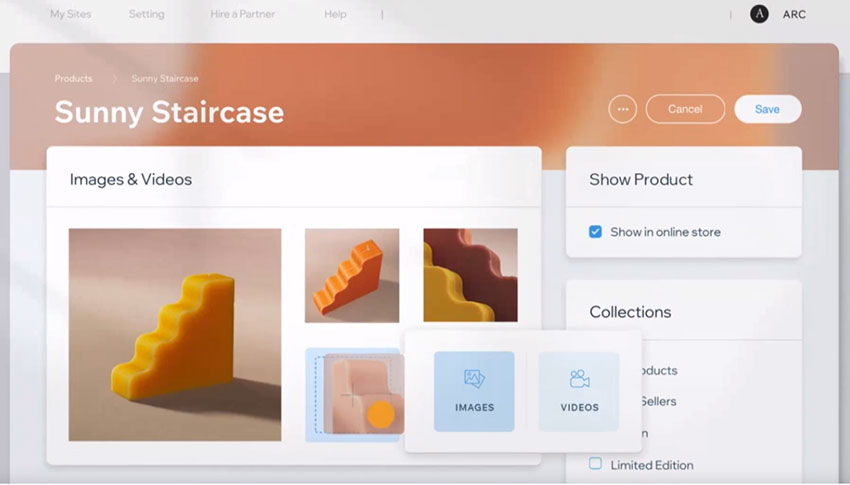
- Easy drag-and-drop interface
- Good for small businesses and beginners
- Beautiful, customizable templates
- Integrated payment gateways (PayPal, Stripe)
- Affordable pricing for small businesses
- Supports social media and email marketing integrations
- Limited scalability for larger businesses
- Customization options are limited for advanced users
- Additional costs for premium apps and integrations
- Migration can be difficult due to Wix’s closed ecosystem
- Transaction fees on certain plans
Ecwid - Best for Adding E-Commerce to Existing Websites
- Price: Free (Paid plans start at $15/month)
- Free trial length: 14 days
- Integrated sales channels: Online store, social media, marketplaces, in-person sales (via POS)
- Best for: Small businesses that want to add an online store to an existing website or blog.
Ecwid is a flexible and cheapest e-commerce solution designed for small businesses, especially those who already have a website and want to add e-commerce functionality. With a free plan available, Ecwid allows businesses to get started quickly and is particularly useful for those selling across multiple platforms, including social media and marketplaces. It’s a good choice for businesses with annual revenues under $500K who are looking for a simple way to add online selling capabilities without rebuilding their entire website.
Ecwid is a great option for businesses starting small, but it has limitations compared to larger, all-in-one platforms. Customization options are somewhat restricted on the free plan, and advanced features require higher-tier plans. Additionally, you may incur extra costs for integrations with third-party apps and payment gateways. Ecwid’s reliance on external websites for full functionality may not be ideal for businesses that need a fully integrated solution.
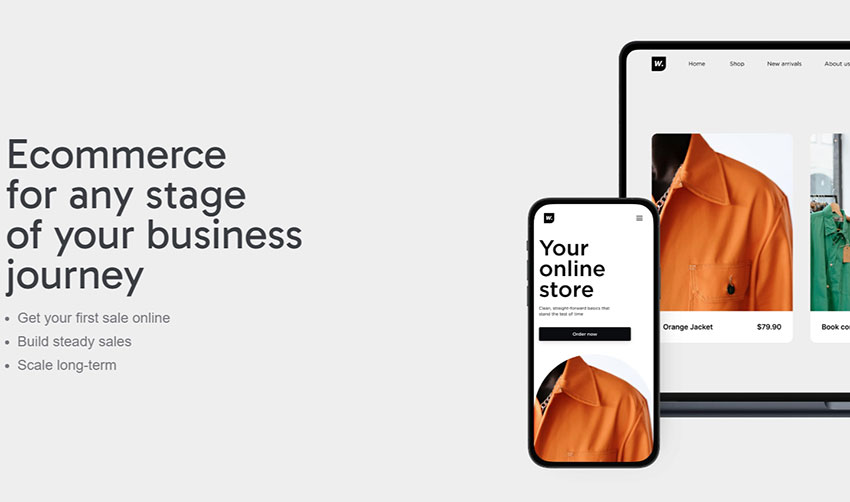
- Free plan available with basic features
- Can be added to any existing website
- Multi-channel selling (social media, marketplaces, etc.)
- Flexible pricing options
- Easy to set up with minimal technical skills
- Supports both physical and digital products
- Customization options are limited on the free plan
- Advanced features require paid plans
- Additional costs for third-party integrations and apps
- Not ideal for businesses looking for an all-in-one solution
- Transaction fees for certain plans
Squarespace - Best for Creatives and Beautiful Designs
- Price: Starts at $16/month
- Free trial length: 14 days
- Integrated sales channels: Online store, social media, email marketing
- Best for: Creatives, artists, and small businesses needing visually stunning websites with built-in e-commerce.
Squarespace is a top choice for small businesses and entrepreneurs who prioritize design and aesthetics. Known for its beautifully crafted templates, Squarespace offers an intuitive drag-and-drop interface that makes it easy for even non-technical users to build a professional-looking online store. With a range of integrations for social media and email marketing, Squarespace is perfect for businesses with annual revenues under $500K looking for a seamless way to sell products while showcasing their brand.
Squarespace can be limiting when it comes to scalability and advanced features. Its pricing starts at $16/month, and while it includes essential e-commerce tools, you may need to upgrade for more advanced features or third-party app integrations. The platform is less flexible than others like Shopify or BigCommerce, which might make it harder to grow as your business expands. Migration from other platforms is also more cumbersome, especially for businesses with large inventories.

- Beautiful, customizable templates
- Ideal for creatives and visually-driven businesses
- Easy-to-use drag-and-drop editor
- Includes built-in e-commerce tools and social media integrations
- Good for small businesses and personal brands
- Affordable pricing for small business owners
- Limited scalability for growing businesses
- Less flexibility compared to other platforms like Shopify
- Higher-tier plans required for advanced features
- Limited third-party app marketplace
- Migration can be difficult, especially for large catalogs
Shift4Shop - Best for a Robust E-Commerce Solution
- Price: Starts at $0/month (for Shift4Shop's free plan with payment processing via Shift4)
- Free trial length: N/A (Free plan available with Shift4 payment gateway integration)
- Integrated sales channels: Online store, social media, marketplaces, in-person sales (via POS)
- Best for: Small to medium-sized businesses that need an affordable, feature-rich e-commerce platform with integrated payment processing.
Shift4Shop (formerly 3dcart) offers a powerful e-commerce solution for businesses looking for a cost-effective platform. With pricing starting at $0/month, businesses that use Shift4Shop's integrated payment gateway (Shift4) can access a full suite of e-commerce tools without paying a monthly fee. This is ideal for businesses with annual revenues under $500K that need a flexible and feature-rich platform to sell online, including tools for inventory management, multi-channel selling, and robust payment gateway options like PayPal, Stripe, and others.
Note that Shift4Shop’s free plan requires using the Shift4 payment gateway, which may not be ideal for businesses that prefer other payment processors. Additionally, the platform’s interface is somewhat dated, and while it offers extensive customization options, it may require a learning curve for those without technical expertise. Migration from other platforms can be straightforward but might require some technical assistance, especially for businesses with large product catalogs or complex needs.

- Free plan available with Shift4 payment gateway
- Feature-rich platform with robust e-commerce tools
- Supports multi-channel selling (social media, marketplaces, etc.)
- Comprehensive inventory and order management tools
- Good for businesses with physical and digital products
- Customizable with a wide range of apps and integrations
- Free plan requires Shift4 payment gateway
- Interface can feel outdated compared to competitors
- Limited design templates and customization without technical skills
- Migration can be challenging for large product catalogs
- Higher-tier plans can get expensive
PrestaShop - Best Free, Open-Source E-Commerce Platform
- Price: Free (self-hosted, with paid add-ons and hosting fees)
- Free trial length: N/A (free to use but requires hosting)
- Integrated sales channels: Online store, social media, marketplaces, in-person sales (via POS)
- Best for: Tech-savvy entrepreneurs or developers who need full customization and control over their e-commerce store.
PrestaShop is a powerful, open-source e-commerce platform ideal for businesses with technical expertise. Unlike SaaS-based platforms, PrestaShop is self-hosted, meaning users can install and configure it on their own server, providing full control and customization. This makes it suitable for businesses with specific needs or those who require advanced features. With no upfront licensing fees, PrestaShop is a cost-effective option for businesses that want to avoid recurring subscription costs (though you’ll need to pay for hosting and any third-party modules or add-ons).
The platform's complexity and technical demands may be a barrier for non-technical users. PrestaShop is not as user-friendly as SaaS solutions like Shopify or BigCommerce, and it may require hiring a developer to set up and maintain the store. Additionally, the platform’s default features are somewhat limited, and most businesses will need to purchase additional modules for things like payment gateways, SEO optimization, and advanced reporting. Migration can also be tricky, especially for large catalogs or businesses switching from other platforms.
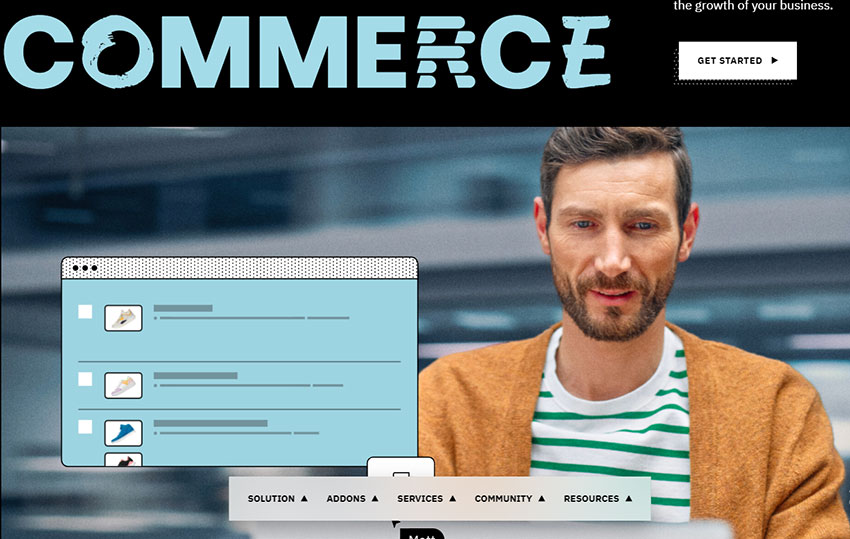
- Open-source and free to use (excluding hosting and add-ons)
- Highly customizable with full control over the store
- Large community with support and tutorials
- Wide range of third-party modules for added functionality
- Flexible for businesses with specific needs
- Supports multi-channel selling (social media, marketplaces, etc.)
- Requires technical knowledge or a developer
- Additional costs for hosting, add-ons, and modules
- Limited out-of-the-box features compared to SaaS platforms
- Migration from other platforms can be complex
- Self-hosted solution requires ongoing maintenance
Zyro - Best Affordable E-Commerce Platform for Small Businesses
- Price: Starts at $2.99/month
- Free trial length: 30 days
- Integrated sales channels: Online store, social media, marketplaces
- Best for: Small businesses and entrepreneurs looking for an easy-to-use platform with a low-cost entry point.
Zyro is a fast-growing website builder and e-commerce platform ideal for small businesses or first-time entrepreneurs who want a low-cost, easy-to-use platform to sell products online. With plans starting as low as $2.99/month, Zyro offers a comprehensive suite of tools, including website templates, online store features, and marketing integrations, at a very affordable price. It's perfect for businesses under $500K in annual revenue looking for a simple solution to get online quickly.
While Zyro's pricing is attractive, it lacks some of the advanced features and flexibility offered by other platforms like Shopify or BigCommerce. The design options are quite limited, and its app marketplace is not as extensive. For businesses needing complex customizations or multi-channel selling options, Zyro may not be the best choice. Additionally, while it has a 30-day free trial, the platform may not scale well for businesses as they grow beyond the basics. Migration can also be a challenge for businesses switching from more robust e-commerce platforms.
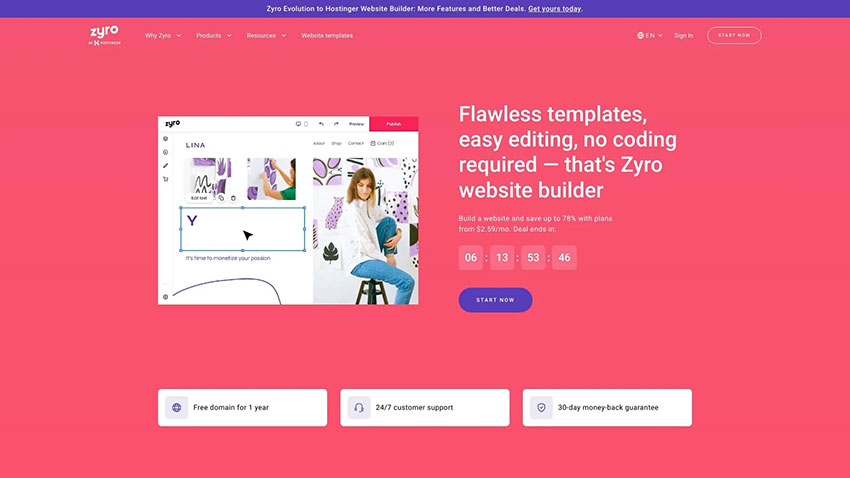
- Very affordable pricing plans
- Simple drag-and-drop interface
- Good for small businesses and first-time users
- Offers website templates and built-in marketing tools
- Includes essential e-commerce tools for online stores
- 30-day free trial
- Limited design flexibility and customization options
- Smaller app marketplace compared to competitors
- Lacks advanced features for growing businesses
- May not scale well for larger businesses
- Migration can be complex for larger stores
 FAQs about the Best Ecommerce Platforms for Small Businesses
FAQs about the Best Ecommerce Platforms for Small Businesses
The best e-commerce platform for small businesses depends on your budget, technical skill level, and specific business needs. Some popular options include:
- Shopify: Best for scalability and ease of use, ideal for businesses looking to grow quickly.
- BigCommerce: Great for businesses with more complex needs, offering robust features for expansion.
- Wix: A user-friendly platform for entrepreneurs who need a simple and affordable solution.
- WooCommerce: Best for businesses already on WordPress looking for a highly customizable solution.
The cost of setting up an e-commerce store can vary depending on the platform and the features you need. Here’s a general breakdown:
- Shopify: Starts at $29/month (with additional fees for payment processing and apps).
- BigCommerce: Starts at $29.95/month (offers no transaction fees, but apps may add to costs).
- Wix: Plans start at $23/month (best for those on a very tight budget).
- WooCommerce: Free to use, but requires hosting ($5–$10/month) and potential plugin purchases.
For a small business with under $500K in revenue, most platforms offer affordable entry points, with potential for upgrades as your business grows.
Yes, all major e-commerce platforms (Shopify, BigCommerce, WooCommerce, Wix) allow you to sell both physical and digital products. Here’s how each one supports it:
- Shopify: Supports both types of products with built-in inventory management and digital product file handling.
- BigCommerce: Also supports digital products, including customization for digital downloads.
- Wix: Provides an easy way to sell digital downloads, but lacks some advanced features available on Shopify or BigCommerce.
- WooCommerce: Fully customizable to sell digital products, with extensive support for digital goods handling.
Migrating to a new platform can vary in difficulty depending on the size and complexity of your store. Here are some insights:
- Shopify: Shopify offers migration tools and expert help, making it relatively easy to move from platforms like WooCommerce, BigCommerce, and others.
- BigCommerce: Provides robust migration support, but the process may take time, especially for larger product catalogs.
- Wix: Migration can be more challenging due to its limited import options compared to other platforms.
- WooCommerce: Migration is fairly simple if you’re moving from another WordPress-based site, but complex for non-WordPress users.
Yes, most platforms support multi-channel selling. Here’s what you can expect:
- Shopify: Supports selling on Facebook, Instagram, Amazon, eBay, and more.
- BigCommerce: Offers integration with Amazon, eBay, Google Shopping, and various social media platforms.
- Wix: Supports basic integrations with social media, but may not have the depth of Shopify or BigCommerce.
- WooCommerce: Through third-party plugins, it supports multi-channel selling on social platforms, marketplaces, and more.
